North Carolina student journalists rush to cover Hurricane Helene aftermath
'When people are running out of the storm, journalists run in'

One of the sources North Carolinians relied on for updates about Hurricane Helene was North Carolina's Weather Authority, a Facebook page with half a million followers.
It’s run by Ethan Clark, a North Carolina State University student.
Reporting from Raleigh, Clark has been posting real-time information, from government updates to damage reports and weather forecasts.
The environmental science and meteorology student started the page when he was in seventh grade. He called the hurricane “western North Carolina’s Katrina.”
“I was born and raised in this state,” Clark wrote on X. “I feel helpless, and that’s why I’ve poured every ounce of my effort into sharing people's stories; it is devastating, and I am at a loss for words. I feel for everyone impacted.”
Student journalists in North Carolina continued to work hard to provide essential information to their communities — and it shows in what they were able to produce despite the challenges posed by the hurricane.

Among them was Anjolina Fantaroni, broadcast news director at Elon News Network. She traveled about three and a half hours from Elon University to report from the mountains.
Despite the minimal impact on her campus, Fantaroni said it was still important to document what happened because many Elon students were from that region — she personally knew six of them.
“When people are running out of the storm, journalists run in,” Fantaroni told The Nutgraf. “If there’s a natural disaster or an issue on campus, if people don’t want to talk about it, we want to talk about it.”
She witnessed demolished houses, cars stacked on top of each other and neighbors helping one another.
“I was actually a little nervous because I didn’t know if we were even going to be able to get coverage, I didn’t know if the roads were going to be closed,” she said. “But when we got there, it was really sad to see. It was heartbreaking.”
Interviewing storm survivors, however, was easier than expected. People were “very much willing to talk,” she said, noting that many lacked access to news due to power outages.
ENN published multiple stories on the hurricane and plans to air a newscast Monday focusing on relief efforts, how an adoption center took in animals from Asheville and how the Elon community can help.
Despite multiple attempts, The Nutgraf couldn't reach student journalists in western North Carolina last week, but their ongoing journalistic efforts were clear in the information they shared publicly.
At Appalachian State University, AppTV, a student-run station, wrote on Instagram that it has paused production until further notice.
“AppTV will continue to share updates on the situation as more information becomes available and decisions are made,” the station wrote, after it’s been sharing updates on damages, press conferences and curfews.
Similarly, the student newspaper The Appalachian published articles about the hurricane's impact both in English and Spanish. It provided live coverage of alerts, closures and announcements from officials from Sept. 27-28.
Its photo gallery showing “devastation and loss” has garnered more than 23,000 views, reporting that students and locals were without power, water and internet.
The paper encouraged readers to share their experiences, photos and videos for a multimedia project documenting the hurricane’s effects on the community.
With no electricity and cell service, residents turned to old-fashioned news sources like radio.
WWCU-FM, a student-run radio station at Western Carolina University, broadcast live hourly updates from 8 a.m. to 5 p.m. last week.
The Nutgraf tuned in last Wednesday at 11 a.m. and noon, hearing student journalists Deanna Sipe and Stewart Butler provide relief updates, official alerts and university news.
The radio station “reaches nearly 160,000 WNC residents, many of whom had been impacted by Helene,” the university’s communication department wrote.
On the print side at WCU, The Western Carolinian said it “doesn’t have definitive answers on how Cullowhee residents were impacted by the storm — we will continue to share updates.”
🔎 Second-day stories
Hurricane Helene was the deadliest U.S. mainland storm since Hurricane Katrina in 2005. The death toll has reached 230. Hundreds were missing and millions left without power.
Several student newspapers, both in North Carolina and other states, have started discussing the accountability aspect of the disaster. Here are some:
Duke Chronicle at Duke University pointed to questions about local government responses, arguing that cities should have issued more urgent warnings and supplied more emergency resources before the storm.
The Green Hope Falcon at Green Hope High School touched on how miscommunication hampered evacuation efforts. It also pointed out that cities inland lack the anti-flood infrastructure found in coastal areas, warning of long-term economic and community impacts.
The Pitt News at the University of Pittsburgh called the hurricane “a governmental failure,” criticizing inadequate preparation and communication from local authorities. The board emphasized that evacuation is not just about leaving town — it’s a matter of privilege that must also be addressed.
The Current at Eckerd College reported that a student and his mother lost everything when their trailer in St. Petersburg, Florida, was destroyed. He wished the school had provided more updates on the damages.
“Not knowing what happened at Eckerd is terrifying because I’ve already lost everything in my trailer, and I don’t know what I lost at Eckerd.”
💬 I want to hear from you: What do you think about the newsletter? Do you have a story idea to pitch? Reach me at nutgrafnews@gmail.com.
🗣️ Happening Next Week & Please Share:
Join The Nutgraf for a panel with three student editors from Oklahoma, New Mexico and California who will talk about how they are covering the 2024 presidential election. Read about the panel and RSVP here.
📅: Thursday, Oct. 17 at 3-4 p.m. ET
Story Spotlight:
⚠️ The Temple News is implementing stricter editorial guidelines after it failed to fact-check and verify statements made by the Students for Justice in Palestine and give the Department of Public Safety a chance to respond to claims.
🚨 The Cornell Daily Sun’s editorial board examined the “broken, unjust and possibly illegal” process employed in the suspension of a pro-Palestinian international student activist.
📝 The Emory Wheel obtained incident and arrest reports from the three police agencies that responded to protests on April 25 at Emory University. The reports shed new light on how police responded to the demonstrations.
☕ The Daily Emerald used health inspection reports to reveal how a popular cafe among the University of Oregon students failed to respond to concerns raised by authorities after multiple health code violations.
🦛 Moo Deng made student news! USC Annenberg Media explained what it is about baby animals that makes them so irresistible. TCU News Now’s anchor called Moo Deng “his favorite story of the show.” The Quinnipiac Chronicle raised concerns about harassment by zoo visitors.
Featured Opportunities:
Mental Health in Journalism Summit takes place online Oct. 8-10. It’s free. One of the sessions is on how Stanford student journalists covered suicides.
The Committee to Protect Journalists and the Thomson Reuters Foundation are hosting a panel Oct. 10 on journalists’ rights in covering the 2024 election.
High Country News is hiring editorial fellows. Apply before Oct. 27.
The Open Notebook is looking for early-career science journalists to apply for its 12-month-long fellowship program by Oct. 31.
Applications for States Newsroom’s Capital Reporting Fellowship are due Oct. 31.
GBH's Spring 2025 internships are open for applications until Oct. 31.
The Boston Globe summer internship program is accepting applications until Nov. 1.
The Dallas Morning News is looking for newsroom interns for next summer and fall. Apply before Nov. 1.
Business Insider has multiple openings for its fellowship program that will begin in January.






